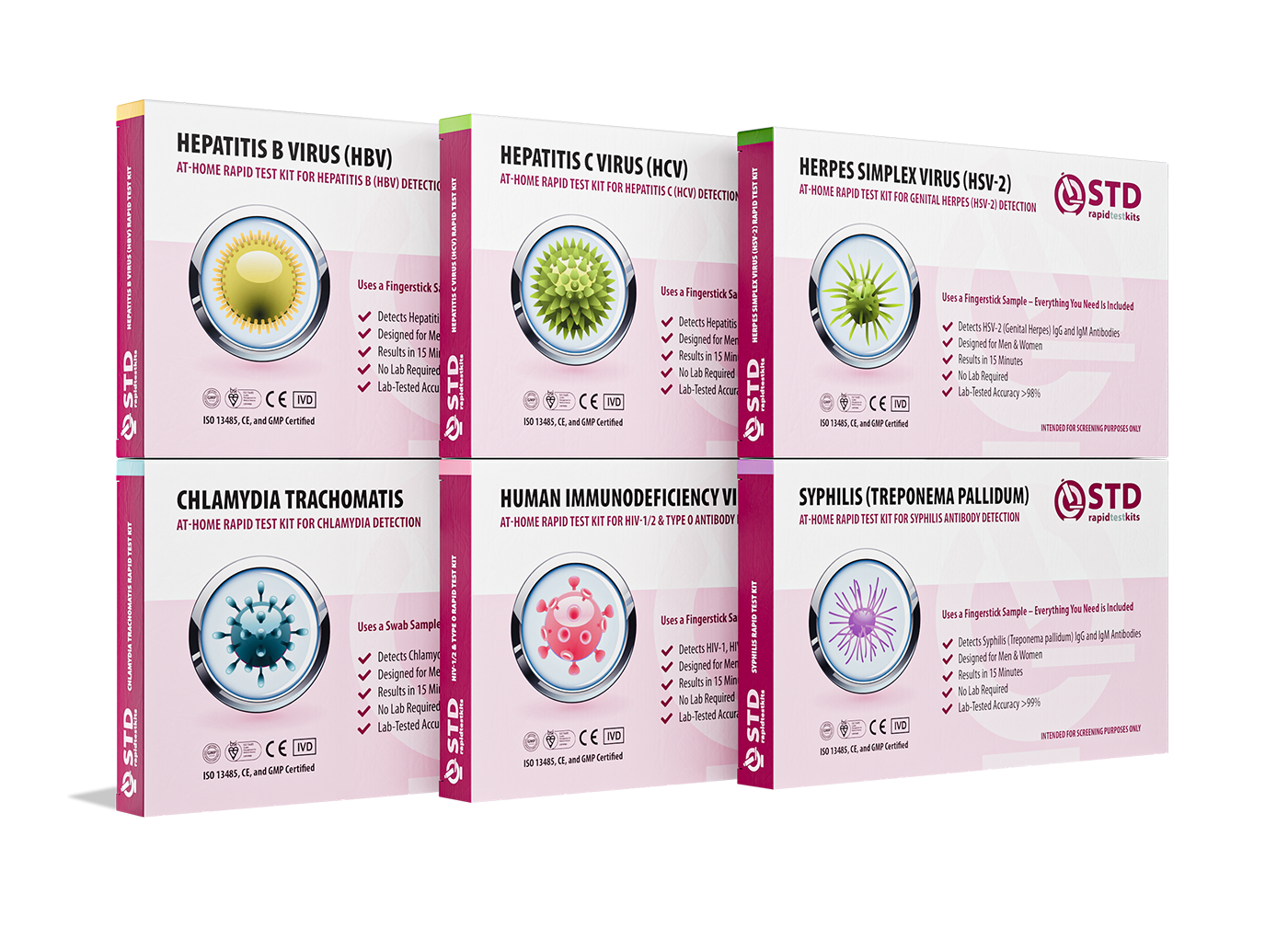Quick Answer: STD-related sore throats, usually from oral Gonorrhea, Chlamydia, or Herpes, often mimic colds or strep, making them easy to miss. If your sore throat lingers after oral sex or feels “off,” consider getting tested.
When Your Throat Feels Off, but Your Strep Test Is Negative
Let’s start with symptoms, because that’s what brings most people to the internet at 2AM. You’re probably Googling phrases like “weird sore throat after hookup,” “strep but not strep,” or “can oral sex cause throat infection.” And you're not wrong to wonder. According to a CDC report, a growing number of oral Gonorrhea and Chlamydia cases are going undiagnosed, not because they’re rare, but because they often look like something else.
Here’s what those infections might feel like:
A sore, raw feeling that lingers longer than a cold. Swollen tonsils with no fever. Redness that spreads from the back of your mouth to your throat. White or yellow spots that don’t come with the usual strep symptoms. A feeling of tightness when swallowing, or a sudden awareness of your lymph nodes.
Some people don’t feel anything at all. And that’s the scariest part, especially with oral Chlamydia, which is often asymptomatic. That means you could be carrying and passing it to others without knowing it. One study published in the journal Sexually Transmitted Diseases found that up to 90% of people with oral STDs had no symptoms at all.
So if you’re sitting there trying to figure out whether it’s just a weird virus or something more serious, don’t guess. Let’s keep going.
How STDs End Up in Your Throat in the First Place
Here’s a thing most sex ed classes forgot to mention: oral sex can transmit STDs. Not “maybe.” Not “rarely.” It’s a confirmed, well-documented route of transmission. And it doesn’t matter if it’s giving or receiving. Gonorrhea and Chlamydia thrive in mucous membranes, including the back of your throat.
Picture this: someone performs oral sex on a partner with an undiagnosed genital infection. The bacteria travel, settle, and begin to replicate in the throat. It might feel like a tickle at first. Maybe nothing at all. But within days or weeks, those bacteria can inflame the tonsils, create white spots, and trigger pain that gets dismissed as “just a cold.”
The numbers back this up. A 2024 NIH-backed study found that nearly 20% of all Gonorrhea cases in young adults were isolated to the pharynx, meaning the throat was the only infected site. That’s huge, considering most screening still focuses on genitals and ignores oral exposure unless specifically requested.
And if you’re wondering, yes, you can also get Herpes this way. HSV-1 and HSV-2 both can infect the throat during oral sex, though they’re less common than Gonorrhea or Chlamydia. When Herpes hits the throat, it can cause burning, ulcers, and even difficulty swallowing.
All of this points to one simple truth: your sore throat might not be about the weather, your allergies, or your post-bar karaoke session. It could be something your body is trying to tell you after a sexual encounter.

People are also reading: STD Testing Before Marriage in Different Cultures
Case Study: “I Thought It Was Tonsillitis. It Was Gonorrhea.”
Jules, 23, didn’t think twice when their throat started hurting after a weekend trip to see their long-distance partner. “It felt like I was coming down with something,” they said. “Nothing dramatic. Just a sore throat and some swollen glands. I figured I picked something up on the plane.”
A week passed. Then two. They went to urgent care. The strep test came back negative. The doctor suggested rest and fluids. But something didn’t sit right. “My partner had just gotten tested and had a clean bill of health,” Jules said. “But I hadn’t been tested in over a year.”
On a hunch, they ordered an at-home throat STD test. Two days later, the results came back: positive for oral Gonorrhea. “I was stunned. I hadn’t even known you could get it in your throat.”
Jules’s story isn’t rare. It’s a warning sign of how overlooked these infections are, and how important it is to test beyond the genitals when symptoms don’t add up.
Why No One Talks About Oral STDs, But Everyone Should
If you’ve never heard of oral Chlamydia or throat Gonorrhea, you’re not alone. For decades, the focus of STD testing, prevention, and public messaging has centered around genital symptoms. The idea that your mouth can be a site of infection? Almost completely left out of the conversation.
There’s stigma here, big time. Oral sex is often treated as "safer" or "not real sex," especially in school-based sex education or even some medical settings. The problem? That way of thinking makes it easier to miss real risks. A 2023 study in JAMA found that many young adults believed you couldn’t get an STD from giving oral sex, and even fewer knew testing was possible for it.
If you add shame, silence, and no visible symptoms to that, you have the perfect recipe for a late diagnosis. People don’t ask. Providers don’t test, so infections keep spreading.
Let’s be crystal clear: oral sex can absolutely transmit infections, especially if condoms or dental dams aren’t used. And while we should never shame anyone for how they explore their bodies or connect with others, we also shouldn’t hide information that could protect them.
STDs don’t make you dirty. They make you human. And knowing your status? That’s power, not weakness.
The Silent Spread: When You Don’t Even Know You Have It
Here’s where things get tricky, and why throat infections are often missed. Many oral STDs have zero symptoms. Or their symptoms are so mild, they blend in with everyday annoyances. A sore throat during allergy season? A little mucus after a night of drinking? Easy to dismiss.
But in the background, bacteria are quietly replicating. You might pass the infection to new partners without realizing it. According to the World Health Organization, asymptomatic transmission is one of the key drivers behind the global surge in sexually transmitted infections, especially among people under 30.
And the throat is particularly sneaky. Unlike genital infections, which might cause discharge, burning, or pain, throat infections can sit silently for weeks or months. Sometimes they’re only discovered when a partner tests positive, or when a sore throat just won’t go away and someone finally asks for a throat swab.
That’s why symptom-based testing isn’t enough. You have to test based on exposure, not just on how you feel. If you’ve had unprotected oral sex, it’s worth checking your throat, even if everything seems fine.
Because silence doesn’t mean safety. It just means you’re missing information you deserve to have.
Check Your STD Status in Minutes
Test at Home with Remedium6-in-1 STD Test Kit

 For Men & Women
For Men & Women Results in Minutes
Results in Minutes No Lab Needed
No Lab Needed Private & Discreet
Private & DiscreetOrder Now $119.00 $294.00
For all 6 tests
Why Regular Doctors Might Miss It (And How to Ask for a Test)
Even with rising awareness, many medical providers still don’t automatically screen for oral STDs. Unless you specifically request a throat swab, chances are it won’t happen. Why? Because many testing protocols are still outdated, focusing only on genital urine samples or vaginal swabs.
It’s not your fault if you’ve never had your throat tested. The system doesn’t make it easy. And sometimes, the provider themselves isn’t up to date on how often these infections happen outside the genitals.
So how do you advocate for yourself?
You can start by saying: “I’ve had oral sex recently and I’d like a throat swab for STDs, including Gonorrhea and Chlamydia.” If you don’t feel comfortable asking that out loud, or don’t have access to a provider you trust, an at-home throat STD test can be a game-changer. It’s discreet, fast, and puts the control in your hands.
Sites like STD Rapid Test Kits offer throat-specific tests you can take from home, including combo kits that check multiple infections at once. No awkward conversations. No waiting rooms. Just clarity and next steps.
What Treatment Looks Like: It’s Not a Big Deal
Okay, let’s say your test comes back positive. Breathe. You’re not gross. You’re not broken. You’re part of a very large group of people who had a very normal human experience.
Most throat STDs are treatable with a short course of antibiotics. Gonorrhea and Chlamydia respond well to targeted medications, often a single dose or a week of pills. Herpes is different, it doesn’t go away completely, but can be managed with antiviral meds that reduce symptoms and transmission.
The hardest part? Honestly, it’s usually just making the call or opening the test kit. Once you know what you’re dealing with, treatment is usually quick and straightforward.
But here’s what makes it urgent: untreated infections can sometimes lead to complications. Gonorrhea in the throat can spread to other parts of the body, triggering more serious systemic infections. That’s rare, but it happens. The sooner you treat it, the safer you and your partners stay.
And no, this doesn’t go on your “permanent record.” You don’t need to tell your boss. You don’t need to make a public post. The only people who need to know are you, your partners, and a provider if you choose to treat it medically.
Your body is yours. Testing it is an act of care, not confession.
Let’s Talk About Pleasure, Not Punishment
If the idea of getting an STD from oral sex makes you want to swear off intimacy entirely, take a breath. You don’t have to stop having sex to stay safe. You just need better tools, better knowledge, and less shame around using them.
Let’s start with something simple: oral sex isn’t risk-free, but it’s also not dirty or dangerous. It’s a deeply common, deeply human way of connecting. And it deserves the same care we give to other kinds of sex, emotionally, physically, and medically.
For some, that means using barriers like flavored condoms or dental dams. For others, it’s about regular testing, open conversations with partners, and trusting your gut when something feels off. There’s no one-size-fits-all solution, but there’s always a way forward that centers your pleasure and your health at the same time.
Because here’s the truth: prevention isn’t about control. It’s about freedom. When you know your status, when you have tools to protect yourself, when you’re empowered instead of scared, that’s when sex actually becomes safer and more satisfying.

People are also looking for: Why “Real Men Don’t Get Tested” Is Killing Us
What No One Tells You After the Hookup
There’s something deeply vulnerable about noticing a sore throat days after a hookup. Maybe it was casual. Maybe it was someone you trusted. Maybe it felt great in the moment. And now, you’re lying in bed wondering if something invisible was passed along, and what that means about you.
It means you’re human. It means you had a moment of connection. And now it means you’re paying attention to your body. That’s not shameful. That’s self-respect.
Too many people sit in that shame spiral and delay getting tested. They wait until it’s unbearable. Or they convince themselves it’s “just allergies.” Or they search Reddit threads for answers they could get in two days with a home test. The result? More anxiety, more confusion, more silent transmission.
Here’s a better way: check in with yourself. Trace the timeline of symptoms. Think about your last few encounters. And if something feels off, even if it’s just a whisper of worry, honor it. Testing doesn’t mean you’re accusing anyone. It means you’re giving yourself clarity.
You can swab your throat, send it off, and get answers in days. You don’t need permission. You don’t need a referral. You don’t even need to explain. Just decide that you deserve to know what’s going on inside your body, and take the first step.
This at-home combo test kit checks for the most common STDs, throat infections included, and can help you move from fear to fact in under a week.
Real Talk: This Is Happening More Than You Think
If your sore throat turns out to be strep, great. If it’s just a lingering cold, even better. But if it’s an STD, you’re not an outlier. You’re part of a growing population of people dealing with oral infections in the age of hookup apps, normalized oral sex, and post-pandemic testing gaps.
One study published in The Lancet found that as many as 1 in 5 STD cases among young adults involved oral exposure, and yet fewer than 10% of those people had ever received a throat swab.
This isn’t about blaming behavior. It’s about calling out a blind spot. We live in a world that encourages experimentation, but doesn’t equip people with the right information to do it safely. We tell people to “get tested,” but don’t clarify that a urine test doesn’t check your throat. We shame symptoms instead of spotlighting solutions.
That ends here. Your sore throat matters. Your sex life matters. Your peace of mind matters. And you don’t have to wait until it gets worse to start taking care of all three.
FAQs
1. Wait, can I really get an STD in my throat?
Yeah, you really can. It sounds wild, but bacteria like Gonorrhea and Chlamydia don’t just hang out in genitals, they love mucous membranes, and your throat is full of them. If you've given oral sex without protection, that sore throat might not be allergies.
2. How would I even know if it’s an STD and not just strep or a cold?
That’s the kicker, you might not. Throat STDs often feel just like everyday stuff: scratchiness, mild pain, maybe swollen tonsils. But if your symptoms stick around longer than usual, or don’t come with a fever or cough, that’s your cue to investigate. Especially if you recently had oral sex.
3. What if I don’t have symptoms, can I still have something?
Totally. That’s actually really common. Some people have zero symptoms and still test positive for oral Gonorrhea or Chlamydia. You can be a “silent spreader” and not know it. That’s why testing based on *exposure* (not just symptoms) is key.
4. Can I get tested without going to a clinic?
Absolutely. You can do it from home in sweatpants. The Combo STD Home Test Kit includes a throat swab, and it ships discreetly. No judgment, no awkward waiting rooms, just clear results and peace of mind.
5. Do I have to tell my doctor I think it’s from oral sex?
You don’t *have* to, but it helps. Most clinics won’t swab your throat unless you mention oral sex. If you’re nervous, you can say something simple like, “Hey, I had unprotected oral and I’d like to test my throat.” Or skip the convo altogether and go the at-home route.
6. What does treatment look like if I do have something?
It’s usually quick and easy. Antibiotics for Gonorrhea or Chlamydia, and antiviral meds if it’s Herpes. You’ll probably be fine within a week, and honestly, the relief of *knowing* is often the best medicine of all.
7. Okay but real talk, does this make me gross?
Hell no. It makes you normal. Curious, connected, and human. We live in bodies. We share spit. Sometimes things get passed around. There’s no shame in that, only empowerment in how you deal with it.
8. Can I get Gonorrhea just from kissing?
It’s possible, but rare. Gonorrhea likes mucous membranes, but it usually takes more than a kiss. Oral sex is a much more common route. For kissing, Herpes is the bigger concern, especially if someone has an active cold sore.
9. Should I stop giving oral sex altogether?
Nah. You don’t have to live in fear to live safely. Just get tested regularly, use barriers when you want that extra layer of protection, and check in with partners about their status. Safer sex isn’t about saying “no”, it’s about saying “yes” with clarity and confidence.
10. I’m scared to test. What if I don’t want to know? That fear is real. But you deserve answers, not spirals. Knowing lets you act, treat, and protect yourself and your partners. And if it turns out you’re clear? That’s instant relief. If you’re not, you’ll catch it early and deal with it like the badass you are. Either way, you win.
You Deserve Answers, Not Assumptions
If your sore throat is making you spiral, you’re not overreacting. You’re being smart. Too many people are told they’re paranoid, dramatic, or just need to “wait it out.” But your body’s signals are valid. And your instincts are worth listening to.
Whether it’s Gonorrhea, Chlamydia, Herpes, or even just a stubborn cold, you deserve to know what’s really going on. Testing is the best way to get answers, take a breath, and finally be there for yourself (and your partners).
Don't put off getting the clarity you need. This at-home combo test kit checks for the most common STDs quickly and discreetly.
Sources
1. Morris et al., 2006: Pharyngeal gonorrhea
2. Javanbakht et al., 2018: gonorrhea infections in young people
3. Khosropour et al., 2021: Incidence of pharyngeal chlamydia
4. EMIS/Belgian study, 2024: Chlamydia and Gonorrhea
5. CDC MMWR, 2019: Pharyngeal chlamydia prevalence
6. WHO fact sheet, 2024: chlamydia
7. Kitchen et al., 2025: the most common site of infection










